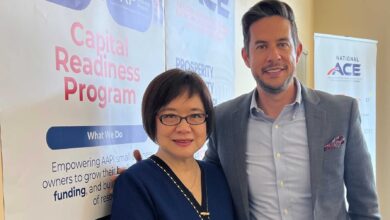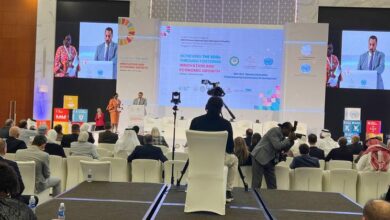Kinfolk: Rapper and Entrepreneur Saweetie Gets Candid About Financial Literacy

The way most Black and brown households have learned about the value of a dollar and the importance of saving money has never been by the books. Due to a lack of education, resources and, honestly, discrimination—many families have implemented and adopted their own rules when it comes to learning about finances and accruing wealth. Rapper and entrepreneur Saweetie can relate all too well.
A 2019 study revealed that 13.8% of Black households did not have a savings or checking account at a bank or credit union, with many citing their distrust in traditional financial institutions as the reason. While this statistic is not surprising, it is certainly eye-opening when we begin to have more conversations around building generational wealth.
“I was never really given the knowledge of how to operate my financial expenses the proper way at a young age,” Saweetie transparently shares with EBONY during our video call.
The Bay Area-born emcee vividly remembers her California upbringing and how her young parents made life great the best they knew how. For them, it wasn’t necessarily about establishing or building wealth, but just making sure the bills got paid while having a little extra money saved up to splurge with.
“What I do remember is that I never liked having to ask my mom or dad for money and them telling me no. So, I figured out how to get my own money from having bake sales or whatever.”
That same “go out and get it” mentality is very common in our communities—we find a way, no matter what it takes. For the “My Type” lyricist, that mindset grew with her through her teen years and even into her college career at the University of Southern California (USC). She launched a successful clothing line in addition to waitressing and picking up work-study gigs to keep money in her pocket and to help pay her way through school. For her, it was just the natural thing to do, based on what she had been taught. But, with that also came some tough lessons.
“I’ve always just loved money and the ability to buy my own things. But, honestly, as far as how I got here, it’s from making bad decisions financially. When you spend your money on the wrong things or trust the wrong people with your money, it forces you to be smarter and wiser. I am just now understanding the facets of my business. But, I’ve gotten here through my mistakes, and it’s taught me the true financial dos and don’ts of making money.”
Fast-forward and Saweetie is truly in her bag. Not only is she a successful rapper, but she’s landed dozens of lucrative brand deals. As she gets older and toys with the idea of having children, she’s understanding the importance of financial health and the impact it has on her future as well as future generations.
During the pandemic, the Icy Records CEO joined forces with her grandmother to launch the Icy Baby Foundation, which educates Black and brown youth in the Bay Area about money. The children learn everything from budgeting and opening a savings account to making financial investments, which is crucial as a recent FDIC report found that over 5.9 million U.S. households don’t have a traditional bank account—over half of those individuals are from diverse communities (Black, Hispanic and Native American).
“It is important to learn the proper way to accrue wealth, beyond keeping money in a shoebox—like I was taught,” she explains. “People in our communities aren’t often taught that. Kids need to know this because when you know better, you do better. As a kid, I had young parents, so they weren’t teaching me that. As long as they had money saved somewhere, they were happy. So, as I began acquiring wealth, I didn’t know what to do with it. I want other kids to know what to do as they generate wealth and see where their money can go.”
To break down taboo conversations around money and personal wealth, financial institutions like Wells Fargo are being intentional about where they are showing up for consumers, especially those living within low- and moderate-income communities–including Saweetie’s hometown of San Francisco. The bank recently opened a HOPE Inside center located in the Bayview District, providing free financial coaching as part of their Banking Inclusion Initiative–a 10-year commitment launched in 2021 to provide more affordable financial resources for unbanked and underserved individuals and families who are disproportionately Black. What’s great is that you don’t have to be a customer of the bank to take advantage of the free financial coaching.
As the checks continue to roll in, Saweetie says sticking to a budget and learning proper investment strategies have been key to her new-found financial wellness journey. She’s taking more time to sit with her team and understand exactly where her money is going, while also learning how the stock market functions in the process.
“There was no reason for me to spend so much money on things that lose value over time. You just think that the money is always going to be there, but I had to take a step back and do a better job budgeting and looking over my statements. Luckily, for me, I have a career where money continues to come in. But, the true test of being a boss is being able to maximize and increase your money. So, my biggest piece of advice to people also running into new money is to really sit with someone—like a banker or accountant—who knows what they are doing so you can map out your money from the beginning and not run into speed bumps later. We don’t like those conversations,” the rapper jokes.
Throughout our nearly 30-minute conversation, a common theme resonated—proper financial education. Not only the education around the importance of having a bank account but also the education around proper wealth building means.
And as she continues to be vocal about her own financial journey, she remains an influence on her community and fans to have those transparent conversations and start taking control over their own financial situations. Whether by shedding light on the Banking Inclusion Initiative at Wells Fargo or through her own organization, she’s encouraging people to get debt under control and budgeting plans in place to finally have the basic bank accounts and a semblance of savings needed to get through day-to-day spending and expenses.
As we closed, Saweetie added one last plea.
“The government needs to implement financial literacy courses for students at an early age, so that it’s second nature. Even if the parents don’t have the resources or knowledge, at least they can get it in the school systems. This is a life survival skill—please!”
To learn more about Wells Fargo’s Banking Inclusion Initiative, visit wellsfargo.com/banking-inclusion-initiative.



